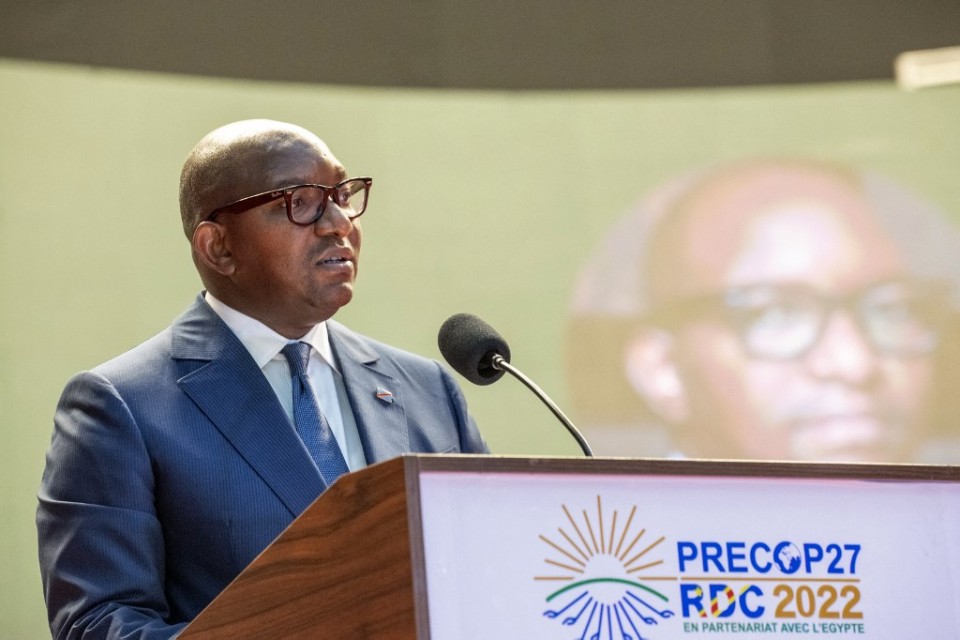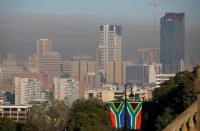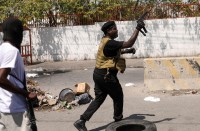
by Annie Thomas
Agence France-Presse
KINSHASA, DR Congo (AFP) — Warning “no-one will escape” a worsening crisis, DR Congo led calls on Monday for a surge in funding to brake global heating and fight its impacts at the start of pre-COP27 climate talks in Kinshasa.
The haggle comes ahead of COP27 — the UN’s 27th summit-level gathering on climate change, which is due to take place in Egypt next month.
At opening ceremonies in the DRC’s parliament building, Congolese Environment Minister Eve Bazaiba called on countries to respect financial pledges and endorse plans to help compensate climate-inflicted damage.
She added that money to protect carbon-absorbing rain forests — of which the DRC has vast tracts — should be viewed not as aid but as an investment in humanity’s future.
“Unless a global effort is made… no-one will escape,” Bazaiba warned. “We all breathe the same air.”
Egyptian Foreign Minister Sameh Shoukry also stressed the need for more money, noting an unfulfilled promise — dating back to COP15 in Copenhagen in 2009 — to provide developing countries with $100 billion dollars a year to fight climate change.
Deputy UN Secretary-General Amina Mohammed offered a gloomy update on the battle today.
“All indicators on climate are heading in the wrong direction,” she said.
– Damages –
Delegates from over 50 countries are attending the two-day informal talks in Kinshasa, including US climate envoy John Kerry. The event winds up on Wednesday with side discussions.
Kerry, after meeting Bazaiba in the afternoon, said he was convinced it was possible to protect the environment, “but also to have appropriate development and job creation in the region”.
No formal announcements are expected in what is billed as a ground-clearing exercise ahead of the next month’s conference, taking place in Sharm el-Sheikh from November 6-18.
UN Secretary-General Antonio Guterres, in New York, urged the world to act at the pre-COP27 talks against what he called “a life-or-death struggle for our own safety today and our survival tomorrow”.
“A third of Pakistan flooded. Europe’s hottest summer in 500 years. The Philippines hammered. The whole of Cuba in black-out. And here, in the United States, Hurricane Ian has delivered a brutal reminder that no country and no economy is immune from the climate crisis,” he said.
Greater support from wealthier countries, historically the world’s biggest carbon polluters, to their poorer counterparts is expected to dominate the talks.
But post-pandemic economic strains and Russia’s invasion of Ukraine have cast a pall over the money question.
The last UN climate summit, COP26 in Glasgow in November 2021, reaffirmed the goal — agreed in Paris in 2015 — of limiting the rise in the Earth’s average temperature to well below 2.0 degrees Celsius (3.6 degrees Fahrenheit) above pre-industrial levels and pursuing efforts to limit it to 1.5C.
However, the latter goal may already be beyond reach as the Earth’s temperature is already 1.2C higher than before the Industrial Revolution.
Poorer countries had also pushed at Glasgow for a financial mechanism to address losses and damage caused by climate change.
But richer states rejected the call and the participants agreed instead to start a “dialogue” on financial compensation for damages.
– ‘We also need bread’ –
Egypt, as host of COP27, has made implementing the pledge to curb global heating the priority of the November summit.
The Democratic Republic of Congo, for its part, is pushing the message that it can act as a “solution country” for climate change due to its vast rainforests, which act as a carbon sink.
Around 30 billion tons of carbon are stored across the Congo Basin, researchers estimated in a study for Nature in 2016. The figure is roughly equivalent to three years of global emissions.
However, the central African nation in July launched an auction for 30 oil and gas blocs — ignoring warnings from environmentalists that drilling could harm ecosystems and release vast amounts of heat-trapping gases.
Bazaiba, the environment minister, told pre-COP27 delegates that Africa was facing a dilemma since the continent has contributed so little to climate change and yet has fossil-fuel resources that could alleviate poverty.
“What should we do in this circumstance, let our children and small children die of hunger?” she asked, as applause rung out in the hall of the parliament building.
“As much as we need oxygen, we also need bread,” she said.
© Agence France-Presse








